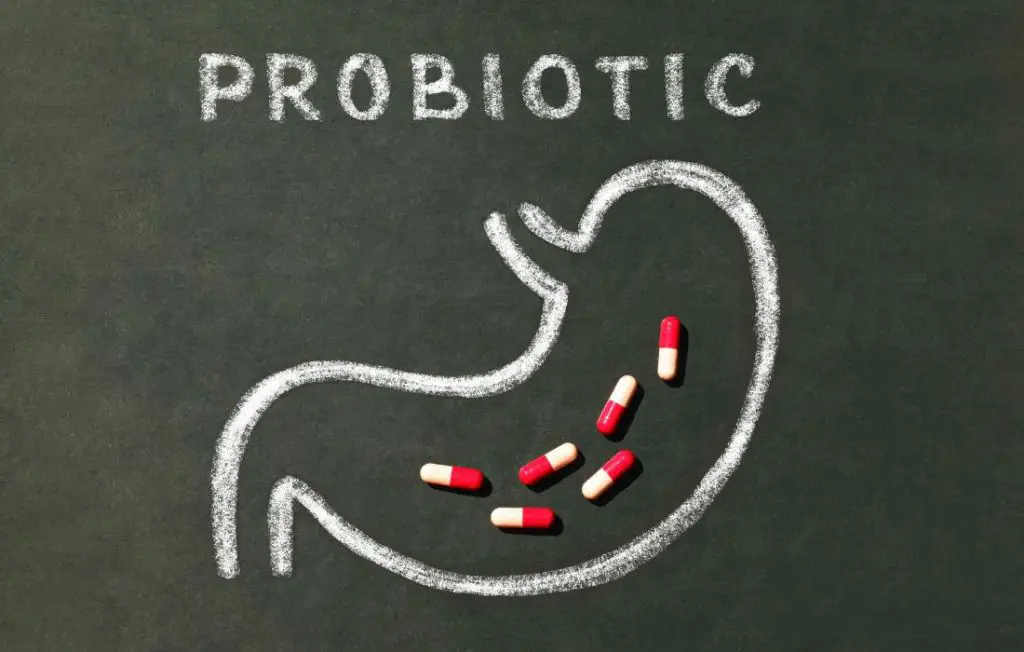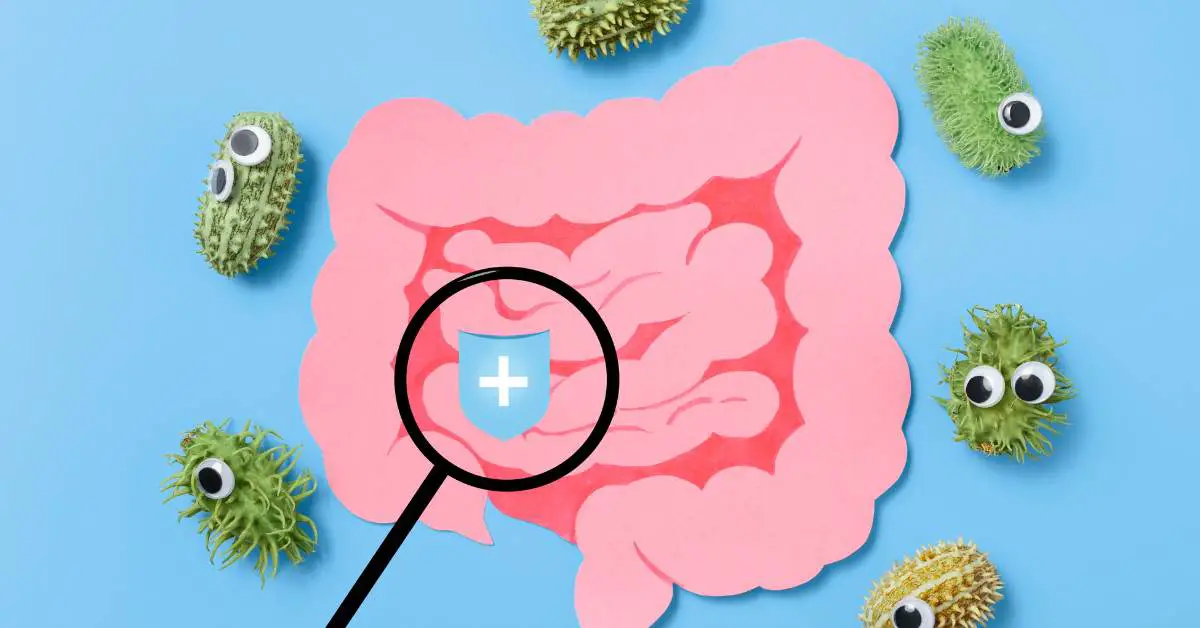We know the role a diverse and healthy gut microbiome plays in health. But if you grapple with histamine intolerance, you have to stay on top of your dietary choices and also be aware of the supplements you take.
You might wonder whether you can take probiotics and what the best probiotic brand for histamine intolerance is. Let’s dig deeper and get some answers.
The Gut’s Role in Histamine Intolerance
Various factors trigger histamine intolerance symptoms, mostly high-histamine foods and foods that liberate histamine, but it’s not just about the food. The interaction between histamine and the gut’s inner workings is key. This connection shows how important gut health is for controlling histamine intolerance.
One factor that contributes to histamine intolerance is low levels of diamine oxidase (DAO). This is the enzyme that breaks down histasmine. When you have too little DAO, histamine stays in your body longer and triggers the frustrating symptoms of histamine intolerance. (6)

DAO Deficiency and the Leaky Gut Connection
Leaky gut syndrome (7), another gut health issue,is another contributor to histamine intolerance. The lining of your intestines is ultra-thin and easily damaged. When it’s injured, undigested food particles, toxins, and histamine can enter your bloodstream. This causes your immune system to respond with inflammation, potentially aggravating histamine intolerance symptoms.
That’s why gut infections and inflammatory bowel diseases can also worsen histamine intolerance. When your gut microbiome is imbalanced, certain bacteria produce histamine as a metabolic byproduct.
Elevated histamine levels, coupled with impaired intestinal barrier function due to gut health issues, contribute to the onset of histamine intolerance symptoms. This shows how a healthy gut microbiome helps regulate histamine levels and overall health.
Plus, an unhealthy gut microbiome can reduce DAO catabolic activity and increase your body’s histamine burden by slowing histamine breakdown. This intricate relationship shows the cascading effect that poor gut health can have on histamine intolerance development.
Also, find out about other causes of histamine intolerance.
Probiotics’ Potential to Address Histamine Intolerance
Research suggests that probiotics can help by influencing the gut’s response to histamine. Histamine, produced by bacteria in the gut, is a key player in triggering intolerance symptoms. The theory is that probiotics could reduce histamine production, thereby calming those frustrating histamine intolerance symptoms.
Furthermore, probiotics could help repair a leaky gut, potentially reducing its permeability and the passage of histamine into the bloodstream. (8) While these mechanisms hold promise, the exact ways in which probiotics interact with histamine intolerance are still unknown.

Should You Take Probiotics with Histamine Intolerance?
Probiotics are potential players in managing histamine intolerance. A study reveals some intriguing insights. Research shows people with histamine intolerance often have an overabundance of histamine-producing bacteria, such as Staphylococcus and Proteus, while simultaneously harboring diminished populations of bacteria linked to gut health, such as Prevotellaceae, Ruminococcus, and Faecalibacterium. (1)
The research above finds that histamine intolerance sufferers are also more likely to have dysbiosis. If you’re unfamiliar with the term, dysbiosis is a fancy name for an unbalanced gut microbiome. When you have dysbiosis, it means your gut microbiome is less diverse than it should be for health. It also means you have a higher population of harmful bacteria living in your gut.
Dysbiosis can come from:
- A diet rich in ultra-processed foods that lack fiber.
- Consuming too much alcohol (1)
- Gut infections, including with Candida, a type of fungus that disrupts gut health (2)
- Microplastics in the food you eat and water you drink (5)
- Taking antiobiotics. (although sometimes they’re necessary)
Interestingly, dysbiosis can cause some of the same symptoms as histamine intolerance (3)
- Digestive issues. Common ones include bloating, gas, diarrhea, constipation, and abdominal pain
- Skin problems such as acne, eczema, and rosacea
- Mood disorders such as anxiety and depression
- Fatigue and a low energy level
Although a probiotic supplement may be beneficial if you have histamine intolerance (and even if you don’t), you should always consult with your healthcare provider before taking one. That’s true of any new supplement you take. Supplements can interact with medications and other supplements and have unexpected side effects.
Your healthcare provider can give you personal guidance based on health history and medications. But what is the best probiotic brand for histamine intolerance?
Exploring Promising Probiotic Strains for Histamine Intolerance
First, know that we don’t know enough about the connection between histamine intolerance and probiotics to say with certainty what probiotic brand is best for histamine intolerance.
Nevertheless, from the evidence we have so far, research suggests that probiotic strains that seem to be most beneficial are: (4)
- Lactobacillus rhamnosus: This strain may reduce gut histamine production.
- Bifidobacterium infantis: May reduce histamine levels in your gut.
- Lactobacillus plantarum: Helps curb inflammation.
But also be aware that certain bacteria you find in fermented foods, like yogurt, can worsen histamine intolerance symptoms. These include Lactobacillus casei and Lactobacillus bulgaricus. Avoid taking probiotic supplements that contain these specific species.
The Best Probiotic Brand for Histamine Intolerance: Choosing a Probiotic Supplement
When choosing a probiotic supplement for histamine intolerance, here are some things to consider:
- Strain selection: Consider a probiotic supplement that contains strains that, based on limited research, may help with symptoms of histamine intolerance, such as Lactobacillus rhamnosus, Bifidobacterium infantis, and Lactobacillus plantarum
- Avoid supplements that contain probiotic species found in fermented foods, like Lactobacillus casei and Lactobacillus bulgaricus.
- Histamine content: Some probiotic supplements may contain histamine-producing bacteria, which can exacerbate symptoms of histamine intolerance. Look for one that is marked as histamine free.
- Quality and purity: Choose a high-quality probiotic supplement from a reputable manufacturer to ensure that the product contains the labeled strains and is free from contaminants.
- Choose a probiotic supplement that is as free of fillers, like preservatives and colorings, as possible.
- Dosage and duration: We don’t know the optimal dosage of probiotics for managing histamine intolerance. Consult with a healthcare professional before starting any new probiotic supplement to ensure it is appropriate for your specific needs and health condition.
Probiotics are a supplemental strategy for targeting histamine intolerance. The main treatment centers around adopting a low-histamine diet. (6) Learn more about probiotic supplements for histamine intolerance.
However, if you choose the appropriate probiotic supplement and consult with your healthcare provider before taking it, it can be beneficial for helping you along your histamine intolerance journey.
References:
- Sánchez-Pérez S, Comas-Basté O, Duelo A, Veciana-Nogués MT, Berlanga M, Latorre-Moratalla ML, Vidal-Carou MC. Intestinal Dysbiosis in Patients with Histamine Intolerance. Nutrients. 2022 Apr 23;14(9):1774. doi: 10.3390/nu14091774. PMID: 35565742; PMCID: PMC9102523. https://www.ncbi.nlm.nih.gov/pmc/articles/PMC9102523/
- Hiengrach P, Panpetch W, Worasilchai N, Chindamporn A, Tumwasorn S, Jaroonwitchawan T, Wilantho A, Chatthanathon P, Somboonna N, Leelahavanichkul A. Administration of Candida Albicans to Dextran Sulfate Solution Treated Mice Causes Intestinal Dysbiosis, Emergence and Dissemination of Intestinal Pseudomonas Aeruginosa and Lethal Sepsis. Shock. 2020 Feb;53(2):189-198. doi: 10.1097/SHK.0000000000001339. PMID: 30829903.
- Shah A, Talley NJ, Holtmann G. Current and Future Approaches for Diagnosing Small Intestinal Dysbiosis in Patients With Symptoms of Functional Dyspepsia. Front Neurosci. 2022 May 6;16:830356. doi: 10.3389/fnins.2022.830356. PMID: 35600619; PMCID: PMC9121133. https://pubmed.ncbi.nlm.nih.gov/35600619/
- Sánchez-Pérez S, Comas-Basté O, Duelo A, Veciana-Nogués MT, Berlanga M, Vidal-Carou MC, Latorre-Moratalla ML. The dietary treatment of histamine intolerance reduces the abundance of some histamine-secreting bacteria of the gut microbiota in histamine intolerant women. A pilot study. Front Nutr. 2022 Oct 21;9:1018463. doi: 10.3389/fnut.2022.1018463. PMID: 36337620; PMCID: PMC9633985.
- Han Y, Zhang X, Liu P, Xu S, Chen D, Liu JN, Xie W. Microplastics exposure causes oxidative stress and microbiota dysbiosis in planarian Dugesia japonica. Environ Sci Pollut Res Int. 2022 Apr;29(19):28973-28983. doi: 10.1007/s11356-022-18547-x. Epub 2022 Jan 7. PMID: 34994935. https://pubmed.ncbi.nlm.nih.gov/34994935/
- Hakl R, Litzman J. Histamine intolerance. Vnitr Lek. 2023 Winter;69(1):37-40. English. doi: 10.36290/vnl.2023.005. PMID: 36931880.
- Frieling T, Gjini B, Melchior I, Euler P, Kreysel C, Kalde S, Krummen B, Kiesslich R, Hemmerlein B. Endoscopic laser endomicroscopy and “leaky gut” in patients with functional gastrointestinal symptoms and food intolerance. Z Gastroenterol. 2022 Nov 23. English. doi: 10.1055/a-1959-3200. Epub ahead of print. PMID: 36417920. https://www.researchgate.net/scientific-contributions/T-Frieling-39263906
- Maguire M, Maguire G. Gut dysbiosis, leaky gut, and intestinal epithelial proliferation in neurological disorders: towards the development of a new therapeutic using amino acids, prebiotics, probiotics, and postbiotics. Rev Neurosci. 2019 Jan 28;30(2):179-201. doi: 10.1515/revneuro-2018-0024. PMID: 30173208.

